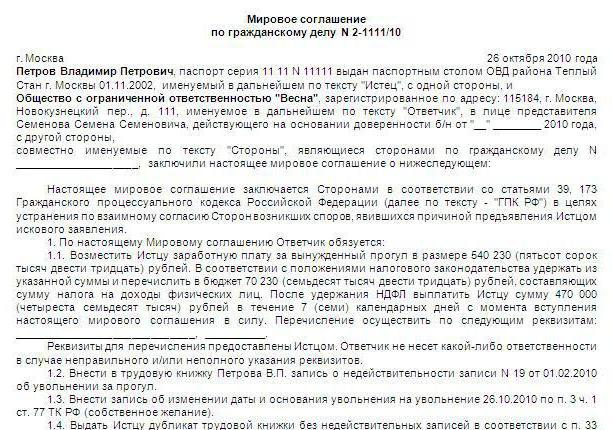The purpose of civil proceedings is to resolve disputes, but every day there are more and more, and the state is taking measures to reduce the burden. To this end, the institution of a settlement agreement was introduced in the CCP. How is it applied in practice and what nuances arise?
Settlement Institute
As with many other things, the Civil Procedure Code does not define the settlement. The reason is simple: an unsuccessful wording of an article of the law will entail serious negative consequences for participants in litigations.

If to summarize the opinion of scientists and practitioners, a settlement is an agreement between the parties to the process on the fate of the lawsuit and claims. The concluded transaction is subject to approval by the court. The judge, believing that she violates the law and harms the interests of the parties, has the right to continue the proceedings.
Legislative regulation
How is a civil agreement regulated in a civil process? Articles of the Civil Procedure Code 39 and 173. It should be noted that the settlement agreement is also provided for by executive legislation. The provisions of the settlement agreement apply, among other things, to civil cases pending in the FSSP. Therefore, in addition to the Civil Procedure Code, the settlement agreement is regulated by the Law on Enforcement Proceedings.
What is the reason for this? Enforcement of the judgment is part of the trial, its completion.

In other articles of the code, in particular Art. 45, dedicated to the prosecutor, contains a ban on his conclusion of a settlement agreement. It also affects other officials of state bodies engaged in representing the interests of citizens.
According to the Code of Civil Procedure of the Russian Federation, a settlement may be concluded by a representative of the party. True, a power of attorney in this regard should have a special reservation. If the power of attorney does not have a mark on the transfer of the right to conclude a settlement agreement, then the representative does not have the appropriate authority.
Settlement Features
Despite its name, the settlement agreement in the CCP has features that distinguish it from the usual agreement:
- form and content are determined primarily by procedural rather than material norms;
- parties to the agreement are parties to the process;
- the consequence of the conclusion is the termination of the judicial procedure;
- the court actually has an impact on the content of the agreement;
- without the approval of the court, the settlement agreement will not get legal force.

Habitual agreements are drawn up primarily on the basis of substantive law (Civil Code and other legislative acts). The parties to the contract within the framework of the law themselves determine the content of its provisions without the intervention of unauthorized persons. Exceptions are expressly provided by law.
Practical nuances
Despite seemingly intelligible formulations, questions remain as to how a settlement agreement is concluded under the Civil Procedure Code.
Nutrient ground for questions - reference to compliance with the law of the agreement. If with contracts it is even more or less clear, then with other spheres of life this paragraph is much more difficult to apply. There is a lot of room for the subjective opinion of the judge.

At the same time, the division of the common property of former spouses, where the rights of children are violated, or a clear bias towards the supplier in relations with the consumer, will be clearly illegal.
Moreover, the refusal of judges is often unmotivated. The definition of refusal to approve an agreement often refers to a rule on the inadmissibility of a violation of the law without specifying what it would consist of.
The role of the court
The judge, according to the law, should initially explain to the participants in the process their right to go to a settlement and talk about the procedure for its conclusion.
Some judges, not wanting to make a decision on the case, make every effort to send the plaintiff and defendant to a settlement. The matter is sometimes put off for several months.
How to arrange
The law offers two options:
- enter the clauses of the agreement in the protocol, then reflect in the definition;
- attach to the case file a statement of the parties about the draft agreement.
It must be said that the law does not contain strict rules on concluding a settlement agreement. Code of Civil Procedure of the Russian Federation does not contain comprehensive information on this subject.
If the dispute concerns a contract, then the structure is approximately as follows:
- terms of the obligation (rights and obligations of the parties);
- term of performance of the obligation;
- cost allocation procedure.
If we are talking about the division of property, the consent is about one of the options developed by the expert.

If none of them satisfies the parties, the court may agree to the one closest to the option that was interesting to both parties. Here, the court decision and the desire of the parties rests in compliance with construction and technical standards. This, by the way, is a good example of how the court ensures that the agreement does not go beyond the law.
Citizens forget that the approval of a settlement agreement on a civil procedure is primarily the prerogative of the court.
If the parties do not agree, the judge continues the proceedings.
Approval Procedure
The judge, having received a draft agreement to which both parties agree, retires to the deliberation room. There he makes a decision, then goes into the hall to the parties and announces it.
The definition of approval is as follows:
- date, place;
- name of the court or world plot number;
- last name, first name and patronymic of the judge, information about the secretary;
- parties to the dispute, subject of the dispute;
- motives for making a decision;
- a resolution part with a statement of conditions (clauses of the entire text of the contract, a variant of the division of the property with a detailed description, etc.);
- appeal procedure (in which court and at what time).
Execution order
How to implement a settlement agreement, the parties decide. Whether or not to prescribe the execution order depends on the terms of the agreement and on the approach of the judge himself.
Consider an example. The debtor and the creditor have agreed that the creditor will refuse to recover if the debtor transfers the agreed amount to him in one payment. For the transfer of funds is allocated, for example, no more than 10 days from the date of conclusion of the settlement agreement. GIC gives complete freedom.
The judge approves the agreement, and as soon as the deadline for appeal - 15 days - expires, it receives legal force.
Refusal of the debtor to execute the agreement gives the right to go to court. The applicant describes the situation, attaches a copy of the definition. At the end of the application, a request for a writ of execution is indicated. Then it is transferred to the FSSP.
Compilation Nuances
Where can I find a sample of the GIC settlement agreement? There are many examples on the Internet. Citizens, wanting to use them, do not pay attention to one nuance.

The procedures for its conclusion in the Code of Civil Procedure and agro-industrial complex have their own characteristics. First of all, we must remember that the agreement, despite the restrictions set by law, is based on the will of the parties. If lawyers participated in the case as representatives, they are involved in the preparation of the document.